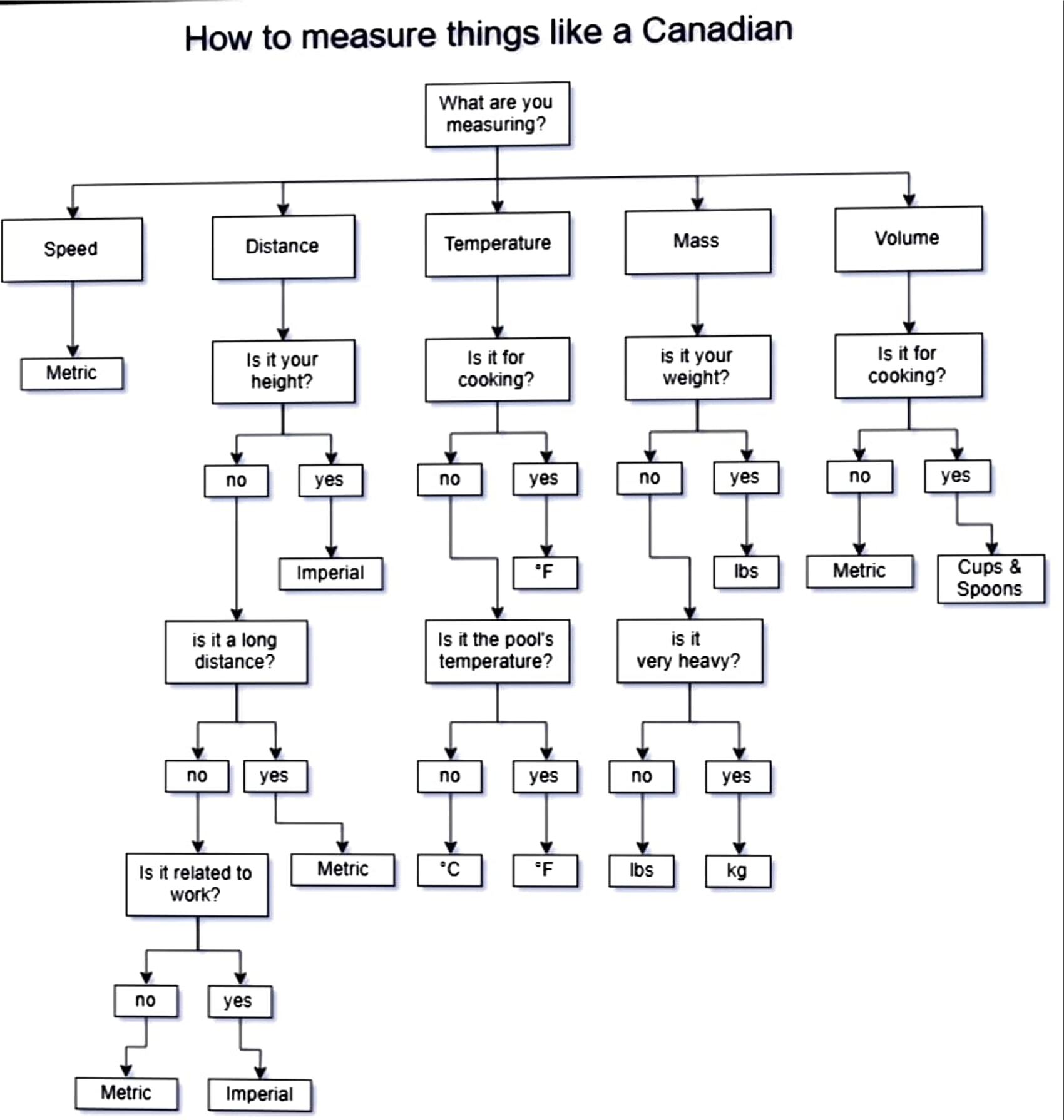- cross-posted to:
- [email protected]
- cross-posted to:
- [email protected]
degree centigrade
Or, as it’s called in the rest of the world, degree Celsius.
In Brasil we use both. Or just degree since we simply don’t mix metric and imperial.
Used to be worse, to quote messers Pratchett & Gaimon.
"NOTE FOR YOUNG PEOPLE AND AMERICANS: One shilling = Five Pee.
It helps to understand the antique finances of the Witchfinder Army if you know the original British monetary system
Two farthings = One Ha’penny. Two ha’pennies = One Penny. Three pennies = A Thrupenny Bit. Two Thrupences = A Sixpence. Two Sixpences = One Shilling, or Bob. Two Bob = A Florin. One Florin and One Sixpence = Half a Crown. Four Half Crowns = Ten Bob Note. Two Ten Bob Notes = One Pound (or 240 pennies). Once Pound and One Shilling = One Guinea.
The British resisted decimalized currency for a long time because they thought it was too complicated."
Neil Gaiman & Terry Pratchett
As an American: What the fuck?
You get my angry up vote. But seriously how is the imperial measurement any better? I mean it is completely and utterly broken with not unified conversions and I can’t imagine that learning all this as a kid wasn’t challenging.
The nice thing about the imperial system is that the units are mostly in scales humans care about. For technical purposes, metric is undoubtedly better, but on the day to day, I’d posit that they aren’t that far apart.
The official metric measure of temperature is degrees Kelvin, though people use Celsius instead because the zero point isn’t useful in day to day life. On that same line, how often do you honestly need to know the precise freezing point of water? The Fahrenheit system of “0 is basically as cold as it usually ever gets, and 100 is basically as hot as it ever gets” is more useful in day to day life.
1 Cup (unit) of water being about the same amount of water in a cup (glass) is useful. The Pint-Quart-Gallon system basically only gets used when buying liquids as discrete units - a gallon of milk, a pint of cream, etc. Metric does the same thing with liters, half liters, and colloquial slang terms for 2 and 4 liters. For continuous measurement of liquids, imperial has ounces and gallons, and metric has milliliters and liters. The clean conversion factor between milliliters and liters is nice, but rarely needed in day to day life.
Functionally, in day to day life, people almost never measure things longer than like 100 feet. Miles are for distances travel, feet and inches are for measured things, and the trickiness in converting between the two rarely comes up. In exchange for that you get units that are relatively easy to visualize in terms of the human body (an inch is about the length of a segment in your index finger, a foot is about the length of your foot or forearm). I’m personally indifferent between miles and kilometers, though the 0-100 scale for how fast your car could reasonably go is kinda nice.
Don’t get me wrong, Metric is better, especially for anything scientific or technical, and having one global system of measurement would be nice, but growing up learning imperial really isn’t that hard, and in day to day life, there are some benefits to using it. Also, we learn metric in school and for anything technical, we use Metric here in the states too.
To be fair, Imperial it’s a base 12 compared to Metric which is a base 10. The nice thing about a base 12 is you can divide it by 3 or 2 which is easier for day to day things. I’m sure also having uneducated masses made base 12 easier when you could do conversions of 3 or 2 units which is easier to understand.
Except if you’re measuring whisky, in which case you use drams. If in a UK pub, a dram may be either 25 ml or 35 ml. Elsewhere, who knows.
That’s a Scottish word really. I know it’s in the UK obviously but it feels distinctly Scottish. Sounds best with a Scottish accent
I feel like the only reason they use stone for weight is to get lower numbers. Plus, you can gain 13 pounds, going from 252 pounds to 265 pounds and still be 18 stone.
Definitely makes sense to me.
This is the first time I hear about “stone”.
It’s 6.35 kg for anyone too lazy to look it up.
My parents (born in Australia in the 1960s) used to use stone, just for weighing people. Everything else is in grams or kilograms.
The older generation in Australia do still use stone a lot, in my experience.
My mum used to use stone, but stopped using it in the mid 2000s I think. It’s definitely less common than it used to be!
Whenever we visit the UK we set the GPS units to metric. I have no feel for what, “In 140 yards, turn right”, means. So having directions in metric while the street signs are in Imperial actually works best.
I have no feel for what, “In 140 yards, turn right”, means.
“In a bit less than 140 meters, turn right.”
Those 300, 200, 100 yard countdown signs before a motorway exit ( /// // / ) might actually be 100 metres away from each other
oh another thing British pints aren’t the same as US customary pints
I learned this a while ago and I’m still mad about it. >.<
Same thing for the gallon, the cups used in cooking, the ounce, the quart …
Distance -> Yes -> “Are you in an aeroplane?” -> Nautical miles
but that’s just the majority of the aviation industry, isn’t it?
¯\_(⊙_ʖ⊙)_/¯
Though there is an extra exception on the weighing people thing. If it’s a scientific or medical setting then the measurement is in kg (because official organisations are meant to use metric (though some of the weirder elements of our current government are trying to undo that for reasons)).
For those confused on the outside as to why we do this to ourselves there is sound reasoning. We switched to metric quite late having mostly done it to align with the EU. This means our largest demographic (boomers because of course) were brought up on an imperial measurement education. That means colloquially people use imperial as that’s what they know. Officially most things are done in metric now but imperial measurements are included with items on sale to help the metric challenged generation. Metric is what is taught in schools with imperial only taught as a “if you encounter an imperial measurement this is what it is in metric”. Though obviously there is a bit of a drag effect because when everyone else is using Imperial for measuring a particular thing, of course the kids are going to use that measure as well.
Road and speed signs stuck with imperial as the cost of replacing literally everything is greater than the value it would bring (especially given the demographic knowledge issue). And alcohol is measured in pints as the concept of a British pint is a cultural heritage (plus the extra 68ml compared to our European brethren is a bonus).
The aim was the eventually phase out imperial entirely as the people who weren’t educated in metric gradually die out, though there as I said there are a bunch of government who decided for some reason to try and push officially switching back to Imperial for the sole reason of “let’s diverge from the EU for the sole reason of being able to say brexit actually had a point to our boomer voters”.
If pint glasses didn’t exist or weren’t the largest acceptable beverage glass, in sure we wouldn’t be using it any more.
That’s what you get when you suddenly switch from imperial to metric 🤷. It’s a bit more “tidier” (from what I know) in the US. They started putting up distance signs with both miles and km in some states, so people get a general idea of how they correlate to each other… which is good I guess. I mean, most of the world has a general idea how to convert a mile to a km (it’s 1.6, but I use 1.5 to get a general ballpark figure), while only military personnel over there have an idea of how much of a distance a km is.
They still measure weight about anything flesh or food related in pounds though.
Canada did a sudden change and adjusted pretty well. Moved here recently and they’re pretty consistently metric, though I see some use of Fahrenheit every so often, though I think that’s by virtue of being close to the US.
Pretty mix in Canada, not as mix as UK but:
Pool and oven temps, height, weight, construction mesurment, cooking mesurments = imperial.
Outdoor temps, distance and speed = metric.
There’s a similar chart for Canadians:

That’s good 👍. I still have no idea how cold or hot it is if someone expressed temperature in Fahrenheit.
There’s a wonderful BBC archive video on YouTube of a 1978 video interviewing people on the streets of Britain about switching to Kilometres. Fascinating to see the attitudes and level of knowledge about it from the time.
Yeah, It did surprise me to be honest, didn’t know that many people actually knew how they relate to each other, back in the day I mean. Some were opposed to changing, but still, a lot said they’d be pro for it. Interesting.
Did we watch different videos? The only person who seemed in favour sounded like he was German. One person was worried that you get less mileage in your car with kilometres. Another mentioned that Britain used to rule the world and now it’s “part of a community”, which they said “ain’t right”. Yet another said they fought 10 years in the war (?) to keep things how they are, but now people want to change everything.
All in all, the sentiment was overwhelmingly negative.
We all know the “Britannia rules the waves” guy voted brexit if he was still alive haha.
Maybe, I didn’t get that cuz English is not my first language and Brits kinda talk funny, I can barely understand them, so you’re probably right.
Y’know what, I actually need a typing exercise right now, so since you didn’t ask for it at all, here’s a transcript:
Lady in blue jacket: “Well I travel abroad a lot, well when we go abroads you don’t get as much mileage too them… to it, and therefore your gonna use more petrol and then they say: ‘oh you… so many miles’ right? Well you’re not doing that, you’re not gonna do the mileage what they say you’re gonna do because the kilomolametres are not the same as the mileage; it’s shorter!”
Lady taking goods from a market stall and stashing them under her shawl whilst talking: “It’s the Treaty as Rome as my husband would say, everything’s been defs-decimalised, it’s horrible, I can’t bare it.”
Man in blue jumpsuit: "We’re losing a-all our national heritage in’t we?
Presenter: “Like what?”
MBJ: “Well like, y’know, the money’s all changed, the decimalisation, all the weights being changed, measurements and everything. And I think y’know, we’re an island on our own y’know and let’s face it; we once ruled the world didn’t we? Y’know? And now we’re just being part of a community. I don’t agree with it at all.”
Enthusiastic German guy: “It is much better. Much better, much easier.”
Worried looking Irish lady: “What?”
EGG: “The kilometres”
WLIL: "What’s ‘the kilometers’?
EGG: “Instead of m-miles. It’s goes in tens and thousands of… Thous-thousand metre is a 1 kilometre yes?”
Present: “Do you know what a kilometer is?”
London underground employee: “No.”
Man with bobble on his hat: “Well 8…80…80 kilometres is 50 mile an hour.”
WLIL: “Oh rubbish!”
EGG: “What the rubbish? What you talking rubbish?”
WLIL: “Rubbish! That’s what it is! Why don’t they leave everything alone… With their kilometre’s and their… so, oh for God’s sakes!”
Presenter: “But kilometres are nice and round. I mean…”
WLIL: “Oh sure.”
EGG “Yes! She don’t know.”
WLL: “I don’t! I don’t want to know either!”
Cheerful lady on mobility scooter: “It doesn’t much matter to me, I only go 4 miles an hour and I don’t really worry very much about either!”
Former solder: “I got a little old saying, it may not be at it… any beneficent for people like you. We had a little bloke with a moustache like that. His name was Chamberlain, he was the Prime Minister. He daid ‘Now we’re gonna fight a war to make it a better land to live in.’ That was for me, it was 19 years of age. Did 10 years in the war, come back here and now everybody wants to change the way that I went and fought for! It ain’t right, I want it as it is now! What I really nearly sacrificed my life for!”
Cheerful lady on mobility scooter: “It doesn’t much matter to me, I only go 4 miles an hour and I don’t really worry very much about either!”
This one’s like me 🤣.
- Gas prices went up again last night man…
- So? Doesn’t make any difference to me, I still fill for a 20.
Different views about the same situation 🤷. It doesn’t really bother me. I really can’t do anything about it, so why bother sulking about it.
Still, you’re right, the attitude towards changing to metric is all negative, except for the German guy, but that’s understandable 😂.
Lol. Those people definitely talk funny.
What is a stone
It’s a brewery in Southern California. No wait, it’s a small rock.
(Serious answer, it’s a unit of measurement equal to 14 pounds.)
6 and a bit kilograms.
For me personally it’s all metric… unless I am talking about the height of people. So I can respect this mess. :P
Ah! That’s reassuring, I thought only Canadians making their lives arbitrarily complex when measuring things.
Having lived in places that used both systems, I have to say - I’m objectively on board with distance and weights in metric, but I’ve been less on board with temperature. The Celcius scale is good for science, but less useful for human measurement than Fahrenheit is. Fahrenheit zooms in closer to the human experience of temperatures (around 0F/-17C to 100F/37C) and so allows for slightly more variation when describing temperature in sets of 10 (that range of 100 digits in Fahrenheit is only 54 digits in Celsius, so it makes Celsius feel roughly half as detailed when talking about it). Anything below 0 in Fahrenheit is unbelievably cold. Anything above 100 is unbelievably hot. Celcius centers on freezing/boiling, which I get, but that’s not terribly useful for daily human purposes; namely weather. The temps from around 40 to 100 in Celsius aren’t useful to humans. It’s all just “really fucking hot”. So I give a big thumbs up to everything metric except for Celcius.
It’s not like you need 100 degrees of granularity in telling the temperature of the weather. Also, 0 degrees Celsius is by far the most influential temperature in day to day life, at least if you live somewhere it occurs.
boiling water is also a fairly important temperature, and it doesn’t take much brainpower to figure out roughly where between freezing and boiling you like to be.
Plus it’s nice to have the reference points be quite objective, you can create a celsius thermometer that’s reasonably accurate without much work, and i feel like it makes relating to temperatures outside the scale easier too.
The amount of energy it takes to bring a volume of water from freezing to boiling is plainly observable and has a nice size for comparing to e.g. the melting point of metals.
If we could start from scratch, I would define an absolute temperature scale where water freezes at 500, roughly 1.83x the kelvin scale.
So 4xx is freezing, and the max survivable temperature is around 570. (Water boils at 683, but freezing and boiling can’t both be round numbers on an absolute scale.)
But we do tend to round to the nearest half degree when discussing temperature in the UK. Do people do that with temps in the US or just round to the nearest degree? If it’s the later then the two are similarly granular in practise.
People round to the nearest degree in the US. But that’s kind of my point. It’s more awkward to throw in fractional temperatures and the fact that you do shows that Celsius isn’t properly expanded enough. In Canada people in my anecdotal experience actually haven’t been rounding to the nearest half degree, just the nearest degree thereby making the scale feel less granular.
Not to knock - everyone invariably likes what they’re used to better. I usually get a lot of pushback from people for this opinion. But that’s my point - I concede that even with my familiarity in miles and pounds that kilometres and kilograms are better systems of measurement. The wonder of the metric system is the simple ratios in multiples of 10. But temperature is a realm where that advantage doesn’t exist. And on an objective level, I think Fahrenheit has a better argument for function.
Knowing what properties water will have is really useful in day to day life tho.
I mean - boiling is boiling, right? Do you ever really need to measure whether your water is boiling in daily life? I would concede that it’s useful to know more easily when water will freeze when it comes to the weather. It’s really the higher end of the Celsius scale that I’m critical of. Fahrenheit could share Celsius’s 0 and my criticism would be more toothless. Though Fahrenheit’s logic around 0 is that anything below 0 weather-wise is exceedingly rare and momentous in northern climates. I think that makes sense as an argument. Negatives in Celsius are common (at least in North America), but a negative in Fahrenheit is mouth gaping dreadful levels of cold. That’s at least as intuitive to me as having 0 be freezing. Since 0 implies the bottom of the temperature scale.
It’s intuitive for you, but things are intuitive if you grow up with it. Fahrenheit is anything but intuitive for me, even if, thanks to the internet, I’ve been confronted with it for years now.
But the point of the reference values is to be… referencable…
How do you reference 0F? Referencing 0°C is trivial albeit not strictly accurate, and 100°C is equally trivial though only accurate to within like 5 degrees.
And this isn’t a theoretical issue, it’s fundamentally useful to be able to double check that a thermometer is at least roughly correct.
Both got their pros and cons in day to day life. It’s about getting used to it. The switch to scientific applications is easier with Celsius however….
I find that if something is under one foot people will often use CM (and would definitely use MM for anything really small.) So lengths tend to be: miles, meters, foot & inches, cm, mm.
















